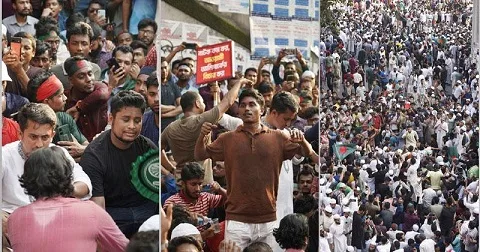
Zakir Hossain From Dhaka
The Muhammad Yumus-led interim government of Bangladesh is seriously considering banning the Awami League (AL), the country’s oldest political party, following growing demands from political parties, civil society, and the public over allegations of authoritarianism, criminal activities, and crimes against humanity.
The Chief Adviser’s Press Wing, in a statement on its verified Facebook page, confirmed that the government has initiated consultations with political parties and is taking into account a United Nations report detailing alleged terrorist activities by AL leaders and activists. It added that the Bangladesh Chhatra League, AL’s student wing, has already been banned and branded a terrorist organization in response to public outcry. The government is also working to amend the International Crimes (Tribunals) Act to take legal action against organisations involved in crimes against humanity. Additionally, it assured that legal steps would be taken against those who facilitated the recent overseas travel of former President Abdul Hamid, accused in a murder case.
Mass protests erupted in Dhaka on Friday, with thousands joining a blockade at the Shahbagh intersection after a call by Hasnat Abdullah, chief organiser (South) of the National Citizen Party (NCP). The demonstration began around 2pm near the Chief Adviser’s official residence, Jamuna, and moved toward Shahbagh around 4:30pm.
Addressing the rally, Hasnat Abdullah said, “We will not leave the streets until the fascist, genocidal Awami League is declared a terrorist organisation, its registration is revoked, the party is banned, and a clear judicial roadmap is presented for their trial.” He added, “Awami League has blood on its hands at every stage of history… I don’t want to stay in Bangladesh with the virus called Awami League.”
The rally drew participation from various Islamist and right-wing parties, including Bangladesh Jamaat-e-Islami, Islami Chhatra Shibir, Hefazat-e-Islam, and organisations like Students Against Discrimination (SAD), July Oikya, July Manch, and Inquilab Manch. Police set up barricades blocking roads from Hotel Intercontinental toward Kakrail Mosque, while protesters carried placards demanding justice and chanting slogans against the AL.
BNP Standing Committee member Abdul Moyeen Khan, however, distanced the party from the demand to ban the AL. “Whether the Awami League will be banned or not is not a matter for the BNP to decide. The Election Commission or the government may take that decision,” he told reporters following a meeting with a Carter Center delegation. Meanwhile, student platforms including Bangladesh Ganatantrik Chhatra Sangsad and July Unity held separate overnight rallies on Dhaka University campus, protesting against the ‘safe exit’ of Abdul Hamid. A B Zubayer of July Unity said, “Abdul Hamid did not flee; he was allowed to leave… Disclose the names of those who gave him safe exit.”
Rezwan Ahmed of Bangladesh Ganatantrik Chhatra Sangsad warned, “The advisers who are opposing the ban and giving safe exits—resign, or the students will pull you down from your positions.” The Chief Adviser’s office urged citizens to remain patient while a final decision is being considered. The Awami League’s downfall began with the ouster of its main figure, Sheikh Hasina, following a student-led mass uprising last year.
